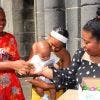
DIS-MOI kicked start a one month national campaign on elderly abuse on 11 May 2019 at the seat of the Rainbow Older People’s Association in Coromandel. This initiative was taken in the context of World Elder Abuse Awareness Day falling on 15 June every year.
Publicité
Since, we have been to five other localities and the reaction and feedback of the audiences have confirmed the connection between abuse and ageism. This is what we have reaped from the mouth of elderly people, inter alia,:
- problem of inheritance following pressure from children on their parents for property sharing
- abusive language used when old parents cannot or do not wish to give money to their children
- the old parents’ presence is ignored though they are sitting among a group of people conversing, they become invisible
- overloaded with work taking grandchild to school and back
- pushed aside when climbing a bus
- laughed at when expressing an opinion at home and in public
- given names by bus conductors in a derogatory manner tantamount to discrimination based on age.
Other observations gathered from our own reading: the cult of young age: young is beautiful, a young elderly is congratulated, an older elderly is taken for ‘something of the past’ specially if he comes from a very poor background.
Points to ponder:
How far do we respect the opinion, autonomy and independence of an older person?
Have we asked him/her he/she is staying in his/her home or in a residential care home of his/her own free will?
How often do we visit our elders in the residential care home to keep the sentimental link as physically they meet rarely?
What do we do to accommodate a resident in a humane and human way?
Is our motto to honour the elderly in our residential care home with dignity and respect?
In DIS-MOI, we are aware in general the mission and vision of a residential care home is to create an environment conducive to the well- being and welfare of the old resident through a philosophy of an open mind with an open heart. It is out of question to hear that venerable couples have confided their possessions to the home which is not the haven they thought to enjoy. Management and carers have so to say had a training ‘digne de ce nom’ to take care of tßhe elderly but alas the picture would be appalling.
According to the World Health Organisation (2018)
- around 1 in 6 people 60 years and above experienced some form of abuse in community settings in 2017
- rates of elder abuse are high in institutions such as nursing homes and long-term care facilities, with 2 or 3 staff reporting that they have committed abuse in the past year
- elder abuse can lead to serious physical injuries and long term psychological consequences
- elder abuse is predicted to increase as many countries are experiencing rapidly ageing populations
- the global population of people aged 60 years and older will more than double, from 900 million in 2015 to about 2 billion in 2050.
What is to be done?
- education on human values and on human rights right from the pre-primary, pedagogues would define and outline the programme.
- mass informal education for out of school youth, jobless people, young and older working people
- revised training of private residential care homes management and staff
- establish clear norms for the opening and running of a home
- reward and punishment for homes ( name and shame if necessary )
This list can be improved, though.
Vijay Naraidoo, President of the Commission for the Rights of Older People of DIS-MOI

Notre service WhatsApp. Vous êtes témoins d`un événement d`actualité ou d`une scène insolite? Envoyez-nous vos photos ou vidéos sur le 5 259 82 00 !





















![[Info Soirée] : « bizin pa negliz bann slow learners »](https://defimedia.info/sites/default/files/styles/square_thumbnail/public/thumbnail_190425.jpg?itok=J--MzK_k)